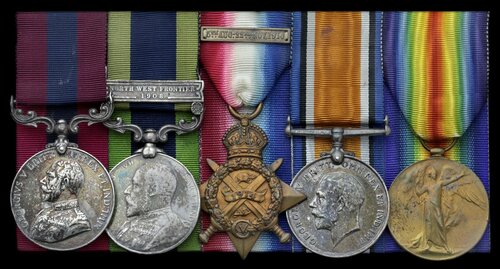
Auction: 22001 - Orders, Decorations and Medals
Lot: 396
He was twice strongly recommended by General French for recognition for valuable services and has also congratulations from Sir Douglas Haig and General Sir H. Plumer upon his good work. It was while serving with his battalion at Potije in February 1916, that he won the D.C.M. for keeping up uninterrupted communication between the front line and headquarters, notwithstanding the fact that our trenches were very heavily bombed and he was partly buried by the trench being blown in. By this means he was instrumental in furnishing useful information concerning the enemy's tactics throughout their attack, at great personal risk
Sergeant Harrison also holds the Indian Frontier Medal and the Mons Star. He had a brother killed while serving with the Green Howards in 1915: his younger brother, serving with the East Yorkshire Regiment has been wounded on three occasions.'
(The Yorkshire Evening Press 18 December 1918)
The 1916 D.C.M. group of five awarded to Sergeant G. G. Harrison, 1st Battalion, West Yorkshire Regiment, for his bravery and devotion to duty in ensuring the lines of communication were kept clear under close and heavy enemy fire
Distinguished Conduct Medal, G.V.R. (8114 Pte G. G. Harrison. 1/W. Yorks:R.); India General Service 1908-35, 1 clasp, North West Frontier 1908 (8114 Pte G. G. Harrison 1st W. Y. Regt.); 1914 Star, with clasp (8114 Pte G. G. Harrison. 2/W. York: R.); British War and Victory Medals (8114 Sgt. G. G. Harrison. W. York. R.), contact wear, polishing and edge bruising, overall nearly very fine (5)
Distinguished Conduct Medal London Gazette 15 March 1916, the original citation states:
'For conspicuous gallantry. During a heavy and continuous bombardment by the enemy, he went out repeatedly on three successive days and repaired the telephone wires. He was on one occasion partially buried by a high explosive Shell, but continued his work with great determination.'
Gustavus George Harrison was born at Leeds, Yorkshire in 1887, the son of Annie Harrison. Enlisting in April 1900 he served as a Private during the expeditions on the North West Frontier in 1908. Harrison is noted upon the medal roll as being transferred to the Army Reserve after the conflict and was doubtless recalled for service on the outbreak of the Great War. Entering the war on 5 November 1914 with 2nd Battalion, West Yorkshire Regiment he served at the Battle of Loos and was wounded at Ypres. Transferring to 1st Battalion, West Yorkshire Regiment prior to February 1916 he was serving there when, between 11-14 February heavy German shelling disrupted Battalion communications. This proved the prelude to an attack on 14 February, it was likely this shelling which precipitated Harrison's act of gallantry, given the he was required to go out on three consecutive days. After his award Harrison was promoted Lance-Corporal, a rank he was still serving in when he wrote to the Yorkshire Evening News on 8 August 1916 saying:
'It is impossible to say how proud I felt the morning our C.O. sent for me to tell me of decoration.'
Harrison survived the war, although one of his brothers was killed and another, Thomas Harrison was invalided due to Trench Foot.; sold together with copied research including M.I.C., census data and London Gazette entries as well as newspaper extracts and medal rolls.
Subject to 20% VAT on Buyer’s Premium. For more information please view Terms and Conditions for Buyers.
Sold for
£1,300
Starting price
£900




